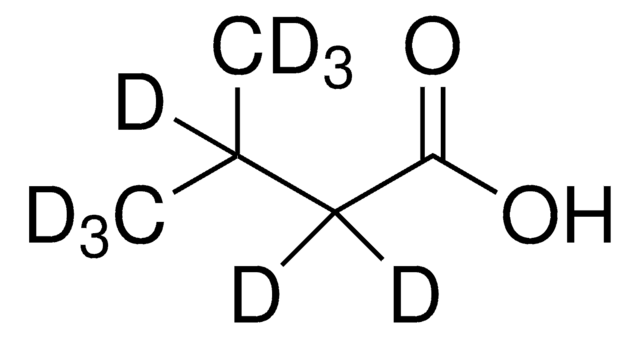129542
Isovaleric acid
99%
Synonym(s):
3-Methylbutanoic acid, 3-Methylbutyric acid
About This Item
Recommended Products
vapor pressure
0.38 mmHg ( 20 °C)
Quality Level
Assay
99%
form
liquid
autoignition temp.
824 °F
refractive index
n20/D 1.403 (lit.)
bp
175-177 °C (lit.)
mp
−29 °C (lit.)
density
0.925 g/mL at 20 °C (lit.)
functional group
carboxylic acid
SMILES string
CC(C)CC(O)=O
InChI
1S/C5H10O2/c1-4(2)3-5(6)7/h4H,3H2,1-2H3,(H,6,7)
InChI key
GWYFCOCPABKNJV-UHFFFAOYSA-N
Looking for similar products? Visit Product Comparison Guide
General description
Application
Signal Word
Danger
Hazard Statements
Precautionary Statements
Hazard Classifications
Eye Dam. 1 - Skin Corr. 1B
Storage Class Code
8A - Combustible corrosive hazardous materials
WGK
WGK 1
Flash Point(F)
176.0 °F - Pensky-Martens closed cup
Flash Point(C)
80 °C - Pensky-Martens closed cup
Personal Protective Equipment
Choose from one of the most recent versions:
Already Own This Product?
Find documentation for the products that you have recently purchased in the Document Library.
Customers Also Viewed
Articles
Probiotics exhibit an inhibitory effect on pathogens, help prevent chronic intestinal inflammatory diseases or atopic syndromes, and support the immune system.
Probiotics exhibit an inhibitory effect on pathogens, help prevent chronic intestinal inflammatory diseases or atopic syndromes, and support the immune system.
Probiotics exhibit an inhibitory effect on pathogens, help prevent chronic intestinal inflammatory diseases or atopic syndromes, and support the immune system.
Probiotics exhibit an inhibitory effect on pathogens, help prevent chronic intestinal inflammatory diseases or atopic syndromes, and support the immune system.
Our team of scientists has experience in all areas of research including Life Science, Material Science, Chemical Synthesis, Chromatography, Analytical and many others.
Contact Technical Service










